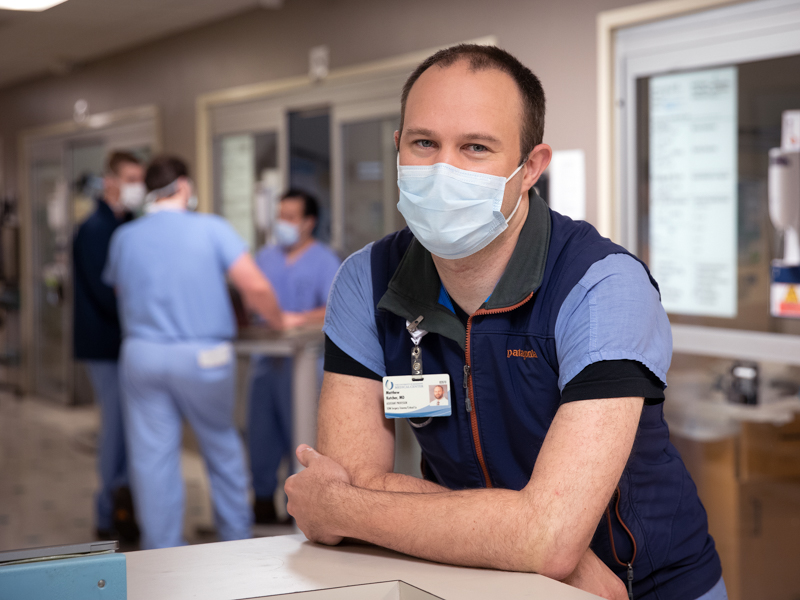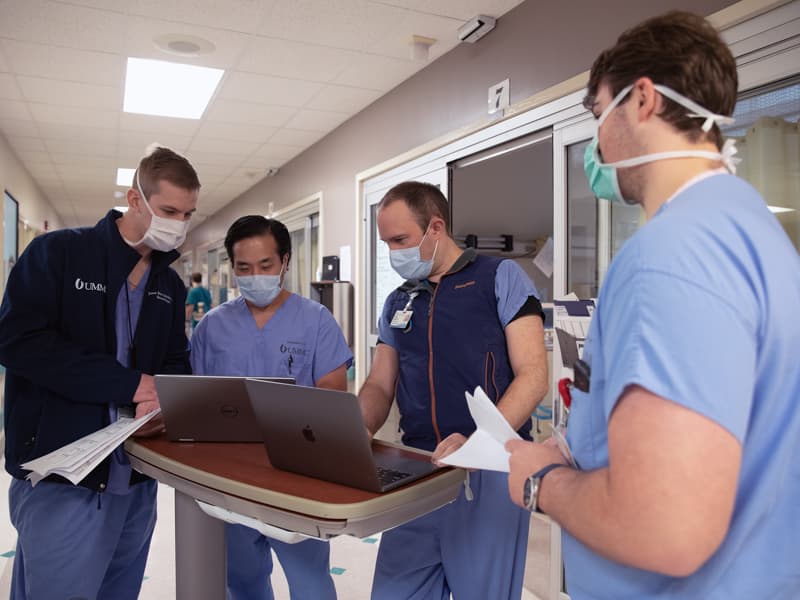October
- Mississippi Center for Clinical and Translational Research Home
- Contact MCCTR
- About Us
- Cores and Programs
- Funding Opportunities
- Training Opportunities
- News and Events
- News Archive
CODA study examines appendicitis treatment options

The appendix might be one of the least useful parts of the body, but it can cause serious problems if it gets infected.
However, the surgery often needed to resolve the issue also has its own challenges. What if a patient can’t afford to miss work? What if they have a health condition that makes surgery more risky?
In a study published online Oct. 5 in the New England Journal of Medicine, researchers found that prescribing antibiotics may be a good treatment option for some patients.
“If a patient has a strong preference to avoid having surgery, it is reasonable to try to treat appendicitis with antibiotics first,” if their condition allows, said Dr. Matthew Kutcher, assistant professor of surgery at the University of Mississippi Medical Center and one of the study’s co-authors.
The Comparison of Outcomes of Antibiotic Drugs and Appendectomy (CODA) Trial found that three in 10 people who tried antibiotics required surgery to remove their appendix in the next three months, showing that this approach is not one size fits all. In addition, appendicitis with an appendicolith, or hard mineral deposit, should usually still be treated with surgery, Kutcher said.
In addition, patients who opted for antibiotics were more likely to have complications that required them to return to the hospital, but also missed less time at school or work compared to surgery patients.

Kutcher said that neither approach is one-size fits all. For instance, people with heart or lung conditions that increase the risks associated with anesthesia may benefit from using a course of antibiotics instead of surgery. It may also be a good option for otherwise-healthy young people, who can tolerate trying drugs first then returning for surgery if necessary.
With the antibiotics approach, a patient “could be treated for appendicitis without having to stay overnight in the hospital,” Kutcher said, receiving an intravenous course in a clinic setting, then taking a course of oral antibiotics at home while resuming regular activities.
UMMC was one of 25 institutions nationwide that participated in the University of Washington-led study that recruited more than 1,500 patients, the largest study comparing surgical and antibiotic use for treating appendicitis.
Kutcher credits Dr. Alan Jones, UMMC assistant vice chancellor for clinical affairs and former chair of the Department of Emergency Medicine, Dr. Chris Anderson, chair of the Department of Surgery and the departments’ research teams for making it possible to bring this study to UMMC. He says that while studies like CODA typically occur at medical centers in larger metropolitan areas, including sites that also serve rural populations helps make clinical research and advanced care more accessible.
Appendectomies are the most common surgical procedure in the United States. About one in 20 people will have theirs removed at some point in their life, usually during adolescence of early adulthood.
“Just about everyone knows someone who has had an appendectomy,” said Kutcher, a trauma and acute care surgeon.
The appendix is a finger-sized tube connected to the intestines. Scientists debate whether it serves as a reservoir for healthy gut bacteria or is just a digestive tract outcast without a purpose. One thing that isn’t up for debate: that the appendix can get infected. Appendicitis occurs when gut bacteria are trapped inside, multiply, and cause inflammation and swelling.
“People with appendicitis will typically report a loss of appetite and pain near their belly button or in the lower right portion of the abdomen,” Kutcher said. “Fever and tenderness are also common symptoms.”
At first, some people with appendicitis may think they have food poisoning or a gastrointestinal bug.
“Typically, those conditions go away without seeking medical attention,” he said. “But most people who have appendicitis say it feels different.”
If the pain does not improve or gets worse over the course of 1-3 days, especially if it’s the lower right quadrant of the abdomen, it’s time to see a doctor, Kutcher said.
If the appendix is perforated, then the bacteria can leak into the abdominal cavity. This can cause an abscess or dangerous systemic infection. In this case, physicians may need to insert a tube to drain the area before surgery. The patient will probably also need a larger surgical incision to remove the appendix and clean the area, which extends the hospital stay, Kutcher said.
The most important aspect of the CODA, he said, is the patients’ involvement in decision-making. CODA was supported by the Patient-Centered Outcomes Research Institute, which funds studies that help patients and caregivers make informed choices about their health care.
“Every aspect of this study involved patient input,” said Kutcher, using tools like focus groups to learn what matters to study participants. For instance, patients asked questions such as “Do I need surgery?” and “What will get me back to work or school the fastest?”
The study will continue follow-up with its participants, checking to see if they would make the same care decisions again.
“We have two very good treatments for appendicitis,” Kutcher said. “Physicians should present these options, their benefits and risks, and participate in shared decision-making process with their patients.”


